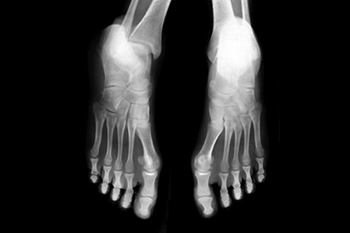Connect With Us
Blog
Causes and Risk Factors of Foot Stress Fractures

Stress fractures are microscopic cracks in bones, and can significantly impact foot health and mobility. These fractures are often the result of repetitive strain and overuse, which can gradually weaken the bones. Athletes, especially runners and dancers, are susceptible to developing a foot stress fracture, as a result of the constant impact on their feet. Sudden increases in activity intensity or duration can also trigger stress fractures. Factors such as wearing improper footwear, inadequate rest between activities, and poor foot structure can lead to a heightened risk of incurring a stress fracture. Additionally, medical conditions such as osteoporosis can reduce bone density, and increase vulnerability. Individuals with certain nutritional deficiencies, hormonal imbalances, or a history of stress fractures can face an elevated risk. Preventative measures include proper training progression, adequate nutrition, and wearing supportive shoes. If you have a foot stress fracture, it is suggested that you confer with a podiatrist who can effectively treat this condition.
Stress fractures occur when there is a tiny crack within a bone. To learn more, contact Dean Kim, DPM from Greater Texas Foot & Ankle Specialist. Our doctor can provide the care you need to keep you pain free and on your feet.
How Are They Caused?
Stress fractures are the result of repetitive force being placed on the bone. Since the lower leg and feet often carry most of the body’s weight, stress fractures are likely to occur in these areas. If you rush into a new exercise, you are more likely to develop a stress fracture since you are starting too much, too soon. Pain resulting from stress fractures may go unnoticed at first, however it may start to worsen over time.
Risk Factors
- Gender – They are more commonly found in women compared to men.
- Foot Problems – People with unusual arches in their feet are more likely to develop stress fractures.
- Certain Sports – Dancers, gymnasts, tennis players, runners, and basketball players are more likely to develop stress fractures.
- Lack of Nutrients – A lack of vitamin D and calcium may weaken the bones and make you more prone to stress fractures
- Weak Bones – Osteoporosis can weaken the bones therefore resulting in stress fractures
Stress fractures do not always heal properly, so it is important that you seek help from a podiatrist if you suspect you may have one. Ignoring your stress fracture may cause it to worsen, and you may develop chronic pain as well as additional fractures.
If you have any questions, please feel free to contact our office located in Frisco, TX . We offer the newest diagnostic and treatment technologies for all your foot care needs.

